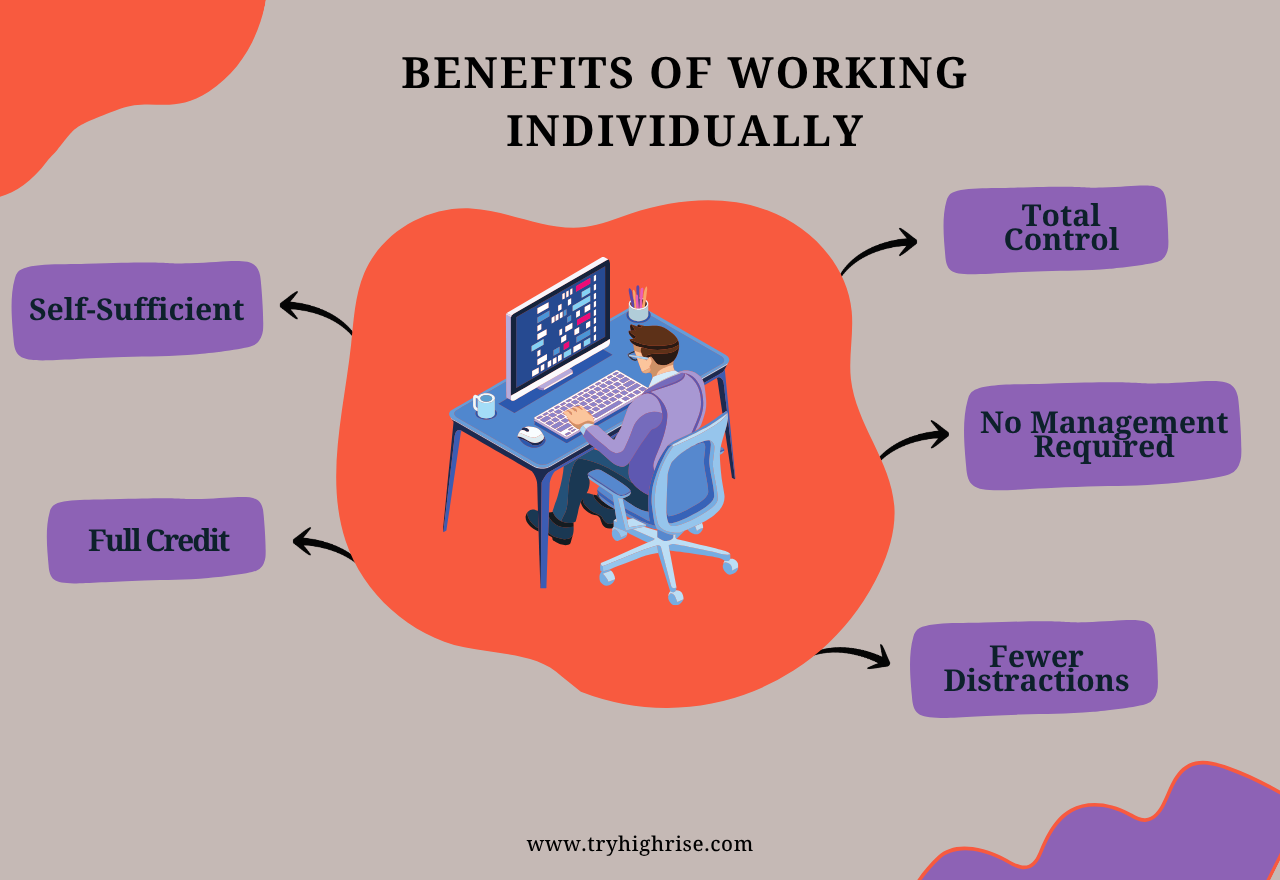

While some people make sweeping claims about this question, there is no correct answer. Some people succeed when surrounded by peers, while other people prefer to be isolated in their work.
This article will explain the advantages of each work setting in the hopes of helping you identify the ideal work setting for you.
<div id="one">
Many people find working alone more comfortable and successful, while others find consolation in group work. Whether or not you can find great individual success working alone often depends on your work ethic and how you function when left to your own devices.
Independent work has a greater impact on your reputation and standing in your field, which can be positive and negative. Below are the five top advantages of working independently to consider when evaluating your productivity.
<div id="two">

A significant advantage of working alone is that you are self-sufficient, so you don’t need to wait for people to sign on to meetings or arrive at the office to begin your individual work.
When working on a task, you don’t have to pause to discuss a point with your team or get approval. In addition, being self-sufficient in your profession can increase your confidence and self-esteem.
Conflicts often arise in teamwork situations where there are contrasting opinions, usually requiring a compromise or concession on someone’s part.
If there is not a related system in place to solve the conflict, it can create tension and prevent a great individual from doing their best work.
But when you work alone, everything is under your control, and you oversee all aspects, such as organization, creativity, and business practices.
When you work alone, you don’t need to share your by-line with anybody. You receive full credit for every paragraph, project, and essay.
Receiving full credit for the quality and individual work can increase your reputation within your industry and eliminate the possibility of your participation being minimized or eclipsed by others.
You get to showcase your skills and expertise more comprehensively, whether you write an academic essay or a fictional story.
One of the worst parts of teams is having to correlate their work times and assign portions of a project to employees.
You’re also responsible for the entire project. This ensures cohesiveness and a standard of quality.
When a great mind works alone, they are their own leader and rarely needs to be managed. Working in a team can slow down the productivity of companies, especially if they require executive coaching.
This advantage isn’t true for all companies and people, but most employees work more efficiently when alone.
Once distracted, it takes the average person 23 minutes and 15 seconds to fully re-focus. If you’re focused on a task, and a team member interrupts you to ask a question or talk about their weekend plans, it wastes valuable time.

<div id="three">
Teamwork isn’t always the enemy of success, and a person can flourish in a company where teams are valued. Examples of good team and teamwork are often found in fields like science and engineering.
Working individually has limitations that can stifle success and smart people, even if more comfortable. Consider the advantages of working as a successful team below and what difference teams can make for a business.
<div id="four">
Collaborative work can breed new ideas and merged concepts that you wouldn't have conjured in your brain. The value of sharing ideas and brainstorming in a group should not be minimized, as it fosters a growth mindset.
You may have a good idea, but your good idea could spur your coworker's brain to think of a great idea, and so on. It also becomes easier to solve problems when more than one brain works on the same dilemma.
While sharing ideas and problem-solving as a team is a form of peer support, there is also an element of compassion and empathy when you work in a good team.
If you didn’t sleep well last night, your well-rested team member can help pick up the slack for the day, and you can return the favor on another day. Don’t underestimate how far a few kind words can go when you become frustrated or stumped.
Believe it or not, a supportive environment can also be competitive. In a team environment, it can become painfully obvious when one coworker is not pulling their weight.
This competition can encourage each worker to work harder and raise the bar for everyone. Too much competition in a collaborative environment is dangerous, but a healthy level of competition can inspire productivity and weed out mediocre minds.
While getting full credit is great, there’s no shame in shared credit. Truly collaborative teams take pride in one another’s success without needing to claim individual credit. As the saying goes, you can succeed as a team or fail as a team.
Even if you don’t get 100% of the credit for what you achieve, you still get to be a part of the achievement and celebrate the win. Shared credit can also be a positive. For example, it can take some heat off you if your work is controversial or poorly accepted.
It’s difficult to network with the world when by yourself, aside from social networks. But if you’re in a collaborative setting, it’s easier to meet new people in your field, show your skills, and grow your network.
Networking can create professional opportunities for more money and more success in your work life. You can also enjoy the social aspect of teamwork you don’t get when working alone.
For example, while discussing weekend plans can be a distraction, it can also create bonds that lead to more trust leading to effective team dynamics, and you may even become friends.
<div id="five">
In the end, success is success, no matter how you get there. But the choice to work alone or with others typically comes down to work satisfaction and personal preferences.